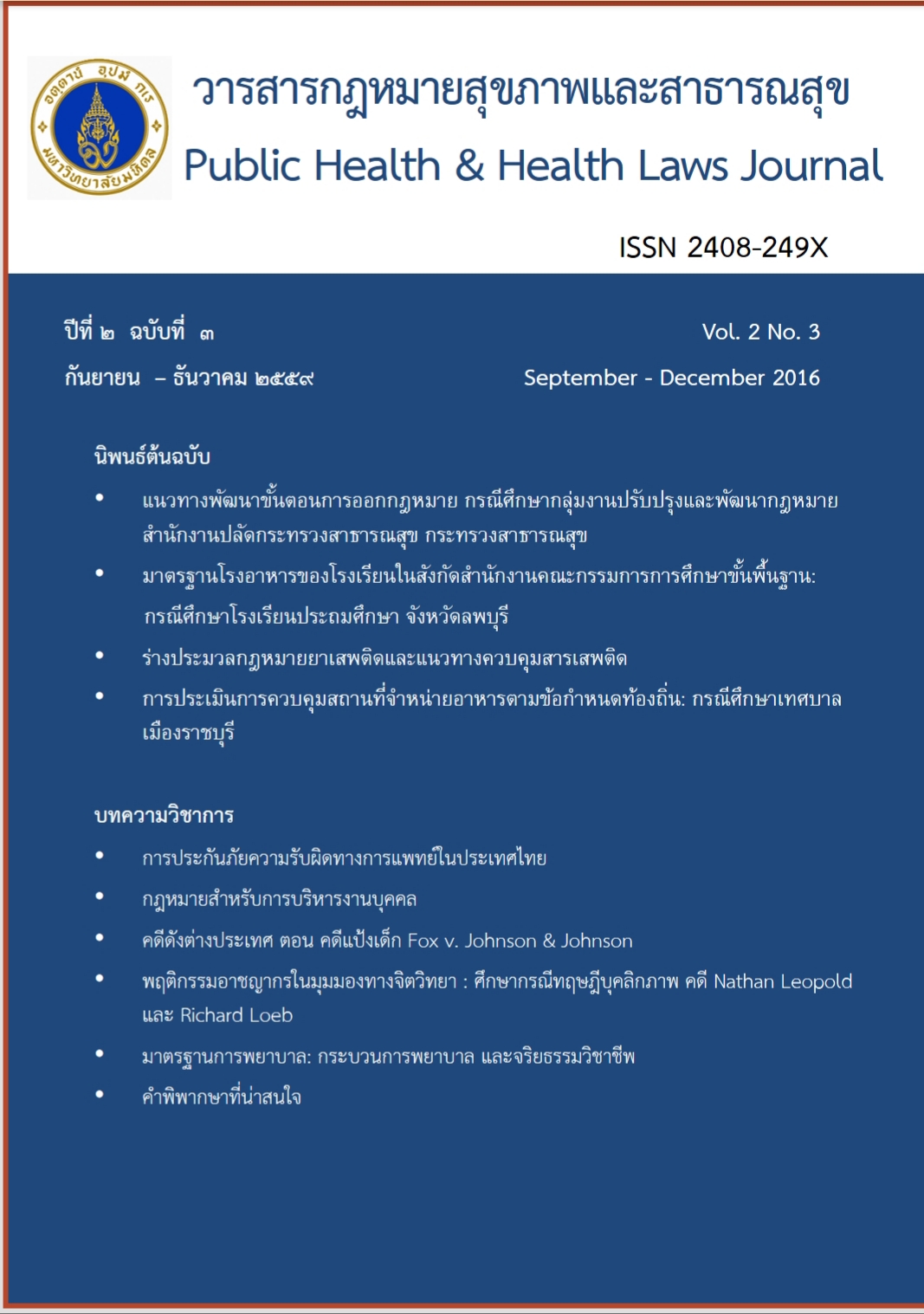Standards of Nursing Care: Nursing Process and professional ethics
Keywords:
Standards of nursing care, Nursing Process, professional ethicsAbstract
Nursing profession is closely related to treating humans. It is associated with the death or alive situation. Therefore, in practice, there are differences between individuals which require nursing process for a standard practice. It consists of five stages: a health assessment, diagnosis, planning, implementation and evaluation. Even though nursing professionals are health services providers, a law is required to control the quality of nursing standards and ethics of the profession, which Nursing Council indicated. This is for the safety of patients, respecting the dignity of patients, and minimizing lawsuits from people who have been injured. Therefore, in addition to the nursing professional knowledge, and nursing skills, practical nurses must be based on ethical standard and nursing professional, based on universal health care practice which are to do no harm, or do not do bad things (maleficence), recognizing the independence of their own body (Autonomy), honesty (fidelity), act in goodness and usefulness (Beneficence), to tell the truth (Veracity), and just (Justice). Moreover, there are also major ethical principles in nursing practice, including individual rights protection, advocacy, accountability, cooperation, and caring.
References
กาญดา รักชาติ. (2543). ประเด็นขัดแย้งทางจริยธรรมจากประสบการณ์ของพยาบาลที่ปฏิบัติงานในหอผู้ป่วยหนัก. วิทยานิพนธ์พยาบาลศาสตร์มหาบัณฑิต สาขาการพยาบาลผู้ใหญ่ มหาวิทยาลัยสงขลานครินทร์ สงขลา.
วณิชา พึ่งชมภู. (2557). คู่มือการฝึกการปฏิบัติการพยาบาลผู้ใหญ่และผู้สูงอายุ. กลุ่มวิชาการพยาบาลอายุรศาสตร์ คณะพยาบาลศาสตร์ มหาวิทยาลัยเชียงใหม่.
จันทร์เพ็ญ สันตวาจา. (2552). แนวคิดพื้นฐาน ทฤษฎี และกระบวนการพยาบาล. พิมพ์ครั้งที่5.กรุงเทพฯ: บริษัท ธนาเพรส จำกัด.
สิวลี ศิริไล. (2555). จริยศาสตร์สำหรับพยาบาล. พิมพ์ครั้งที่12. กรุงเทพฯ: สำนักพิมพ์แห่งจุฬาลงกรณ์มหาวิทยาลัย.
สุวิมล จอดพิมาย. (2551). สิทธิผู้รับบริการและจริยธรรมกับการส่งเสริมสุขภาพ. คณะพยาบาลศาสตร์ มหาวิทยาลัยกรุงเทพธนบุรี
แสงทอง ธีระทองคำ และไสว นรสาร. (2556). กฎหมายสำหรับพยาบาล. กรุงเทพฯ:Offset Plus.
แสงเดือน เมฆราช. (2556). การพัฒนาแนวปฏิบัติเพื่อการส่งเสริมพฤติกรรมเชิงจริยธรรมด้านการปฏิบัติการพยาบาลของพยาบาลวิชาชีพโรงพยาบาลสกลนคร. พยาบาลศาสตรมหาบัณฑิต สาขาวิชาการบริหารการพยาบาล คณะพยาบาลศาสตร์มหาวิทยาลัยบูรพา.
สภาการพยาบาล. (2544). มาตรฐานบริการการพยาบาลและการผดุงครรภ์. สืบค้นเมื่อวันที่ 4 พฤศจิกายน 2559, [ออนไลน์] Available at http://www.tnc.or.th/law/page-6.html
อรนันท์ หาญยุทธ. (2557). กระบวนการพยาบาลและการนำไปใช้.วารสารพยาบาลทหารบก. 15, 3 (กันยายน – ธันวาคม): 137-143.
อุดมรัตน์ สงวนศิริธรรม และสมใจ ศิระกมล. (2558). พฤติกรรมจริยธรรมของพยาบาลวิชาชีพ. เชียงใหม่ : บริษัท สยามพิมพ์พานา จำกัด.
อุบลรัตน์ โพธิ์พัฒนชัย และคณะ. (2550). จริยศาสตร์สำหรับพยาบาล. พิมพ์ครั้งที่1. นนทบุรี: บริษัทยุทธรินทร์ การพิมพ์ จำกัด.
Yura, H. and Wash, M.B. (1983). The nursing process: Assessment, Planning, Implement, Evaluation. 4thed.. Connecticut: Appleton Century – Crofts.
Downloads
Published
How to Cite
Issue
Section
License
Disclaimer and Copyright Notice
The content and information presented in articles published in the Journal of Law and Public Health Policy represent the opinions and sole responsibility of the respective authors. The editorial board does not necessarily agree with or assume any responsibility for the views expressed.
All articles, data, content, images, and other materials published in the Journal of Law and Public Health Policy are the intellectual property of the journal. Any individual or organization wishing to reproduce, distribute, or otherwise use the entirety or any part of such materials must provide proper citation.





